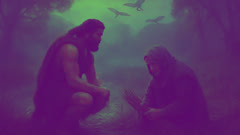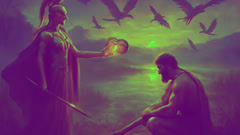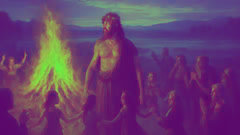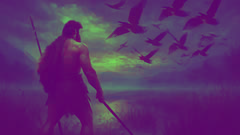Introduction
The Stymphalian Marshes were a land apart, a place where the sun’s rays struggled to pierce the persistent mist and tangled forests pressed in on all sides. Stories of the marsh had traveled from hearth to hearth across the Greek world, whispered by travelers who spoke of a sky darkened by monstrous wings and a countryside haunted by shrieks like the grinding of blades. It was here, beneath a sky forever on the verge of rain, that Heracles arrived, burdened with his sixth labor and the weight of a growing legend. Arcadia was no ordinary land—it was a realm of wild gods and restless spirits, where the boundary between the natural and supernatural blurred. And within its heart, the Stymphalian Birds had claimed dominion, their numbers swelling and their hunger unchecked. These were not mere birds, but creatures of the divine and the dreadful: man-eating, bronze-beaked, their feathers sharper than spears and their eyes glinting with malice. Their coming had driven shepherds from their flocks and woodcutters from the trees. Even the boldest hunters shuddered at the thought of facing such foes. Yet Heracles, son of Zeus, had been tasked by King Eurystheus to rid Arcadia of this scourge. His name was already sung across Greece for labors past—slaying the Nemean Lion, besting the Lernaean Hydra, capturing the Ceryneian Hind and the Erymanthian Boar. But each trial seemed to grow more formidable, and the Stymphalian Birds were unlike any foe he had faced. They were not to be slain by brute force alone; cunning and resolve would be needed to drive them from their haunted realm. Heracles’ journey to the marshes would test not only his legendary strength, but his heart, his mind, and his ability to confront darkness—both in the world and within himself.
A Land Haunted by Wings: Heracles Enters the Marsh
Heracles’ sandals pressed into the sodden earth, the reeds parting before him with a soft shush, as if warning him to turn back. The Stymphalian Marshes sprawled endlessly, a labyrinth of black water, sunken roots, and ancient trees that grew in unnatural forms. Every branch seemed twisted by some forgotten pain; every shadow hinted at hidden dangers. The air itself was heavy, carrying a scent of rot and iron.

He moved with the wariness of a seasoned hunter, every sense alert. Behind him lay the last outposts of civilization: scattered shepherd huts and the distant smoke of Arcadian hearths. Before him stretched uncertainty and legend. The stories of the Stymphalian Birds had grown in the telling. Some said their cries could shatter stone. Others claimed their feathers rained down like arrows. All agreed on one thing: they were deadly, and they took pleasure in terror.
It wasn’t long before Heracles found evidence of their reign. The bones of animals—and some that were unmistakably human—littered the edges of the marsh. Trees bore scars where metallic claws had gouged the bark. Once, as he paused at the edge of a stagnant pool, a single feather floated past, glinting dully in the weak light. It was heavy, unnaturally cold, and as sharp as any blade he’d held.
He remembered Eurystheus’ words, laced with both command and cruel amusement. “Drive away the Stymphalian Birds. Rid Arcadia of their blight. Return only when the skies are clear and the marsh is silent.”
The king’s challenge was more than a test of strength. It was a trial of ingenuity. Even Heracles, who had faced monsters and outwitted gods, hesitated to walk further into this nightmare. But the weight of destiny pressed him onward. There was no turning back for the son of Zeus—no matter how thick the fog or how sharp the talons awaiting him.
As he pressed deeper, the marsh seemed to come alive. Shadows shifted at the corner of his vision; the reeds whispered secrets he could almost understand. Night came quickly here, sliding in on silver slippers, and Heracles made camp beneath a leaning oak, its boughs sheltering him from the worst of the chill. He built no fire; he had no wish to draw the birds’ attention yet. Instead, he wrapped himself in his lion skin and listened to the distant cries—metallic, harsh, echoing over the water like the clashing of unseen swords.
Sleep was uneasy, filled with dreams of endless flight and eyes that gleamed like molten bronze. When dawn returned, pale and uncertain, he rose determined. He had a plan—a faint one, but it was all he had.
He knew that to defeat a foe so numerous and so strange, he would need more than weapons. He searched the marsh, seeking high ground and vantage points. The birds avoided him for now, content to circle high above. But he could feel their curiosity. He was an intruder, and their patience would not last forever.
On the second day, he encountered an old woman gathering reeds by the water’s edge, her face lined with the worry of many years. She looked up at Heracles and her eyes widened—not in fear, but in recognition. “The son of Zeus,” she murmured, bowing her head. “You have come to end our torment.”
He knelt beside her, speaking gently. “Tell me of the birds. How did they come to haunt this place?”
She hesitated, glancing at the sky where dark shapes wheeled. “Long ago, they were sacred to Ares. Banished from a distant land, they found refuge here. At first, they were only a nuisance—stealing grain, frightening children. But something changed. Hunger grew in them, and their feathers became as bronze. They no longer feared man or god.”
Heracles listened closely. “How do your people survive?”
“We hide. We run. We pray for heroes.” Her voice trembled. “But none have returned—until you.”
He promised her that he would not fail. In her eyes, he saw both hope and resignation—the hope of those who had suffered too long, and the resignation of those who had seen heroes fall before.
Armed with this knowledge, Heracles pressed on. The marsh seemed to resist him at every step. Mud threatened to swallow his feet; strange insects buzzed around his head. But his resolve only hardened. By dusk, he had mapped much of the territory, noting where the birds gathered, where the reeds grew thickest, and where the water ran deepest.
He needed a way to draw the birds out—a way to bring them within reach. But every time he approached their roosts, a hundred pairs of bronze eyes watched from above, just out of bowshot. He tried throwing stones and shouting challenges, but the flock only laughed—a chilling sound that mocked his efforts.
That night, as he sat beneath the stars, Heracles pondered his next move. He considered fire, but the marsh was too wet. He thought of traps, but these birds were too clever for snares. Then, as he turned a bronze feather in his hand, an idea began to form—one that would require help from the gods themselves.
Divine Intervention: The Gift of Athena
Heracles had never been shy about calling on the gods when mortal efforts failed. In the hush before dawn, he stood at the water’s edge, hands lifted in prayer to Athena—goddess of wisdom and warfare, she who favored strategy over brute strength. His voice carried over the still waters, sincere and resolute: “Great Athena, grant me your guidance. The birds of Stymphalus are beyond mere strength. I need wit to match their cunning.”

For a moment, the world seemed unchanged. Then the breeze shifted, stirring the reeds and sending ripples across the water. A soft radiance gathered on the far shore, coalescing into the form of a tall woman in gleaming armor, her eyes clear as the morning sky.
“A worthy plea, son of Zeus,” Athena said, her voice resonant as a bell yet kind. “These birds are not easily defeated. Their feathers are sharper than arrows, their numbers vast. But cleverness can scatter what strength cannot.”
From the folds of her robe, she produced a strange pair of castanets—krotala—of hammered bronze, inscribed with patterns older than time itself. “Take these, forged by Hephaestus for my hand. The clatter will terrify the birds and force them into the sky. When they rise, use your bow. Let your aim be true.”
Heracles knelt in gratitude, feeling the divine weight of the krotala in his hands. “Thank you, Lady Athena. I will not squander this gift.”
The goddess smiled—a rare thing—and faded into the dawn. The world returned to its somber hues, but Heracles felt a new certainty kindling within him.
He wasted no time. As the sun struggled up, painting the marsh in cold gold and purple shadows, Heracles readied his weapons: his trusted bow and a quiver of arrows tipped not with bronze, but with poison left from his battle with the Hydra. Every arrow carried death—a fitting counter to the unnatural birds whose feathers had claimed so many lives.
He scouted the marsh for the largest gathering of birds—a half-sunken grove of ancient trees, their trunks scarred and festooned with feathers like grotesque trophies. From high in the branches, hundreds of birds watched him with unblinking eyes, their beaks clacking in anticipation.
With a deep breath, Heracles raised the krotala and struck them together. The sound was like thunder, like shields clashing on a battlefield. It echoed through the marsh, setting every reed and ripple aquiver. The effect was immediate: the birds screamed and launched skyward in a furious storm, wings slicing the air, feathers flying like darts.
Heracles moved with impossible speed. He nocked arrow after arrow, each one flying true. The poisoned shafts struck birds mid-flight, sending them tumbling into the black water below. Yet for every one that fell, dozens more remained. The sky darkened as they wheeled and dove, a storm of metallic death.
The birds retaliated, raining razor-sharp feathers in great sheets. Heracles dodged and ducked behind the ancient trees, feeling the stinging bite of metal in his arms and shoulders. Blood flowed, but he did not falter. Again and again, he clashed the krotala, sending waves of panic through the flock. Each time they took wing, he let loose another volley of arrows.
His heart pounded with the rhythm of battle and the certainty that failure here would mean death—not only for him, but for everyone who called these marshes home. He thought of the old woman, her haunted eyes. He thought of the children hiding in distant villages, waiting for a dawn without shrieking terror overhead.
The birds began to falter. Their numbers thinned as more and more tumbled from the sky, poisoned arrows finding their mark. Some broke away, fleeing into the deepest parts of the marsh. Others, bolder or more desperate, attacked in frenzied waves. One massive bird, larger than the rest and crowned with a crest of pure gold, dove straight at Heracles with a scream that rattled his bones.
He faced it squarely, swinging his club with all his might. Wood met bronze with a sound like breaking thunder. The bird crashed to the ground, shattering reeds and flinging feathers in every direction. Heracles dispatched it quickly, his blade finding the gap beneath its armored neck.
Still, the battle raged on. The marsh seemed to dissolve into chaos: water churned by falling bodies, air thick with blood and feathers, the relentless clash of bronze and bone. Yet Heracles did not falter. His strength was legendary, but it was his resolve—his refusal to yield—that drove him on.
When at last his quiver was empty and his arms burned with exhaustion, he sounded the krotala one final time. The survivors—few now—rose in panicked flight, scattering in all directions. Some vanished into distant lands, never to return. The marsh fell silent but for the ragged breathing of the hero and the gentle lapping of water against fallen birds.
Aftermath in the Marsh: The Legend Grows
As silence reclaimed the marsh, Heracles stood amid the wreckage of battle—bronze feathers embedded in trees, carcasses half-sunk in black pools, blood staining the water red. The air hung heavy with the scent of victory and loss. For every bird that fell, a shadow seemed to lift from the land; yet for every shadow banished, a memory lingered—of violence, of fear, and of one man’s struggle against the impossible.

He spent the next hours tending to his wounds. The metallic feathers had cut deep in places, leaving angry welts across his skin. Yet Heracles bore them without complaint. Each scar was proof that courage was not the absence of pain, but its acceptance and transcendence.
The villagers emerged slowly from their hiding places, drawn by rumors of quiet. First came children, timid but curious, followed by men bearing axes and women with baskets. Their fear faded into awe as they beheld the hero in the marsh—bloodied but unbowed, standing amid the ruins of monsters.
The old woman returned, clutching a bundle of herbs. She pressed them into Heracles’ hands, murmuring prayers of thanks and blessing. Her tears mingled with laughter, as though she could hardly believe that dawn had come without the shadow of wings.
The people of Stymphalus set to work with Heracles, gathering the fallen birds and burning their bodies far from any village—lest their cursed remains bring new misfortune. The flames rose high into the dusk, casting eerie shadows that danced like spirits freed at last. It was a grim task, but a necessary one, and the villagers carried it out with determination born of relief.
As night fell, a celebration began—a cautious one at first, but growing with each song and story shared around the fires. Wine flowed, food appeared as if by magic, and for the first time in years laughter echoed across the marshes. Children danced and imitated Heracles’ mighty blows; elders toasted to his health. The old woman placed a crown of marsh flowers on his brow, declaring him not just a hero, but a savior.
Yet Heracles could not linger long. His labors called him onward; Eurystheus’ commands were not so easily satisfied. Before dawn, he prepared to depart, shouldering his weapons and offering quiet farewells.
“Remember,” he told the villagers, “the gods help those who help themselves. Fear not what darkness may come—face it with courage, as you have faced this day.”
The villagers promised to honor his name in story and song. They would remember not just the hero who drove away the birds, but the lessons he left behind: that fear could be conquered, that even the most haunted places could find peace, and that hope was a gift to be shared.
As Heracles left the Stymphalian Marshes behind, he carried more than scars. He carried the gratitude of a people and the weight of legend—a legend that would outlive even the most monstrous birds, echoing down through ages as proof that courage can turn darkness into dawn.
Conclusion
The legend of Heracles and the Stymphalian Birds would grow with each retelling, woven into the very fabric of Greek myth and memory. In Arcadia, where once the marshes trembled beneath the weight of wings and death rained from the sky, people found new life and hope—proof that even monsters born of gods could be banished by mortal resolve. The tale stands as more than a record of heroism; it is a reminder that darkness is not unconquerable and that even in places most haunted by fear, courage can carve a path to freedom. Heracles’ labor was never just about strength—it was about facing the unknown, trusting in wisdom, and daring to do what others could not or would not. As he journeyed onward toward new trials, his story lingered on the wind in Arcadia: a song of bravery, ingenuity, and the triumph of light over shadow.













